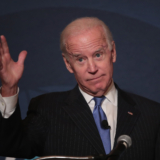18 States Sue to Halt Biden’s Student Loan ‘Handout’
In an escalating saga of legal showdowns, the battleground over President Biden’s ambitious student loan forgiveness plan continues to expand. The latest salvo comes from Missouri, with Attorney General Andrew Bailey leading the charge in a lawsuit against what critics have derisively dubbed the “SAVE” plan. With 18 states now in the legal fray, the cacophony of dissent against Biden’s proposal grows louder by the day.
Bailey’s lawsuit, filed with the vigor of a prosecutor determined to uphold fiscal responsibility, argues that the plan, unveiled in February, stands on shaky legal ground and carries a staggering price tag of $475 billion. At its core, this legal challenge questions the legality and financial feasibility of what many opponents view as a blanket bailout for student debtors.
The crux of the opposition lies in the perception of fairness and accountability. Critics argue that the “SAVE” plan disproportionately burdens American taxpayers while absolving borrowers of their contractual obligations. In their eyes, it’s not a hand up but a handout, a sentiment echoed by Missouri’s top legal representative.
However, Missouri is far from alone in its dissent. Just weeks prior, Kansas and a coalition of 10 states launched their own legal assault on the administration over the same contentious issue. This mounting wave of litigation underscores the depth of division surrounding the student loan forgiveness debate.
Proponents of the plan, including progressive lawmakers and advocacy groups, paint a starkly different picture. They argue that the burden of student debt stifles economic mobility and exacerbates inequality, necessitating bold action from the federal government. To them, this proposal represents a much-needed lifeline for millions of struggling Americans shackled by student loans.
Yet, as the legal battles unfold, it’s becoming increasingly clear that this is not merely a clash of legal doctrines but a reflection of deeper ideological fault lines within American society. It’s a clash between those who advocate for individual responsibility and fiscal prudence and those who champion social justice and collective responsibility.
The outcome of these lawsuits will undoubtedly shape the trajectory of the presidency and the future of higher education financing in the United States. Will the courts uphold the principle of fiscal accountability, or will they pave the way for a seismic shift in how the nation grapples with its student debt crisis? Only time will tell.
As the legal quagmire thickens and the chorus of dissent grows louder, one thing remains certain: the battle over Biden’s student loan plan is far from over, and the stakes couldn’t be higher. In this tumultuous landscape, where law and politics collide, the fate of millions of Americans hangs in the balance.






